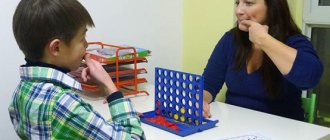Speech therapist - who is this? Speech Specialist. Speech therapy.
Historically, speech therapy developed based on the knowledge accumulated by pedagogy and medicine. Since the 17th century, they seriously thought about the problem of speech disorders, but they believed that only doctors could correct speech deficiencies. The scientific study of speech pathology and its correction began relatively recently, since the basic anatomical and physiological mechanisms for ensuring speech activity became known, i.e. approximately from the middle of the 19th century. The pioneers of the science of speech disorders are neurologists P. Broca (1861) and K. Wernicke (1873), the first of whom showed that the motor functions of speech are localized in the posterior part of the third frontal gyrus of the left hemisphere (in right-handed people) of the brain, and the second described the center sensory side of speech - in the posterior third of the left temporal gyrus. These discoveries began a debate about which parts of the brain are associated with the speech system. This debate lasted several decades. Some scientists insisted on a strict link between these functions and certain centers, while others argued that the entire brain is responsible for these functions.
Speech therapy flourished at the beginning of the 20th century. Government institutions are opening to provide assistance to abnormal children - only for the deaf (schools, houses of contempt).
Already in 1900, Natalia Aleksandrovna Rau, Fedor Fedorovich Rau, Fedor Andreevich Rau, Elena Yuryevna Rau organized a kindergarten for deaf children of preschool age. And in 1915, Fyodor Andreevich Rau became the director of the Moscow Arnold-Tretyakov School for the Deaf, and he also organized short-term courses for the training of speech therapists.
In 1920, the Institute of Childhood Defects was opened in Petrograd at the Institute of Preschool Education. Its leader is David Vladimirovich Feldberg (on his initiative, classes for incoming deaf children, speech therapy centers at schools for children with mild speech disorders, and at clinics for children with more serious speech disorders were created. Under the leadership of D. V. Feldberg, new means and methods of differentiated education for deaf, late-deafened, hard-of-hearing children, as well as children with various speech impairments).
In 1927, the People's Commissariat of Education of the RSFSR issued an order “On measures to combat speech defects in children of school and preschool age.”
In 1929, at the Kharkov Institute of Otorhinolaryngology L.A. Quint and M.O. Paikin created the first department of speech therapy, in which a lot of research and practical work related to speech pathology was carried out.
In the thirties, a speech therapy sector and a special school for children with speech and hearing impairments were organized. The first head was Rosa Evgenievna Levina. The most ambitious achievement of R.E. Levina is the construction of the concept of general speech underdevelopment. She developed a classification of general speech underdevelopment. Under the leadership of R.E. Levina conducted fundamental research that determined the further development of domestic speech therapy. She has developed methods for timely recognition of possible problems in a child’s readiness to learn and ways to eliminate them. She noted that in order to construct a pedagogical classification of speech disorders, it is necessary to take into account both the state of speech means and the properties of speech behavior. As a result of research by R.E. Levina and her colleagues in speech therapy developed an understanding of speech activity as a complex unity, the component parts of which depend on one another and condition each other. Methods for overcoming speech disorders have been developed, which constitute the main content of speech therapy. In 1951, she published the book “Experience in the study of non-speaking children (alaliks)”, where for the first time in speech therapy the principles of systemic analysis of the speech and mental impairment of alaliks were consistently outlined. In 1968, she published the book “Fundamentals of the Theory and Practice of Speech Therapy,” widely known to speech therapists.
In April 1939, the first All-Union Defectology Conference was convened to resolve a number of urgent issues in defectology. Its main idea is that a speech therapist should deal not so much with the disease itself, but with overcoming its consequences for the harmonious development of the individual. The importance of teamwork for the diagnosis and comprehensive rehabilitation of people with speech disorders is emphasized. As a result of the conference, communication was established between various special institutions.
In 1940, the People's Commissariat of Health introduced speech therapists into the staff of children's clinics.
In 1944, at the All-Union Conference, issues of speech restoration in case of traumatic aphasia and stuttering in disabled people of the Great Patriotic War were discussed. The works of A.R. became widely known. Luria “Traumatic Aphasia” (1947).
In 1956, Natalia Nikolaevna Traugott headed the laboratory of pathology of higher nervous activity at the Institute of Evolutionary Physiology named after. I. M. Sechenov. In 1964, Natalia Nikolaevna defended her dissertation for the degree of Doctor of Medical Sciences on the topic: “On sensory aphasia and alalia.” Her research interests included the study of interhemispheric interaction. For the first time in the history of science, she experimentally studied the work of human analyzers with local brain lesions, and studied the work of the auditory analyzer with childhood hearing loss, alalia and aphasia. She was able to differentiate sensory alalia from hearing loss based on the specific nature of hearing impairment.
In 1958, at a joint conference of the Research Institute of Psychiatry of the Ukrainian Research Psychoneurological Institute, issues of practical assistance to children with speech disorders were resolved. The network of preschool and school institutions has expanded. Gardens are created with a 5-day stay.
In 1963, Tatyana Borisovna Filicheva, under the guidance of Professor R.E. Levina and candidate of pedagogical sciences G.A. Kashe is conducting an experimental study to develop the content of remedial education for preschoolers with phonetic-phonemic underdevelopment. With her participation, the first speech therapy groups were opened in general kindergartens. In 1983 she published the book “Teaching and raising children with general speech underdevelopment in the older groups of a special kindergarten.”
Since 1972, the number of diploma (graduation) works in speech therapy has been steadily growing.
Since 1975, in connection with the Government Decree “On measures to further improve training, employment and services for persons with mental and physical disabilities,” the network of preschool institutions in the education system has been intensively developing - speech therapy kindergartens and groups in mass kindergartens are being organized, to which children with various speech disorders, including those who stutter, are sent through selection medical and pedagogical commissions. This work is also beginning to intensify in the healthcare system, the organization of speech therapy rooms in children's clinics continues, speech therapist positions are being introduced in children's homes, and specialized sanatoriums are being organized.
In the eighties, Mikhail Efimovich Khvattsev was the first to divide all the causes of speech disorders into external and internal. He also identified organic (anatomical-physiological, morphological), functional (psychogenic), socio-psychological and neuropsychiatric causes. Mikhail Efimovich developed a classification of speech disorders. He did a lot to create a system for correcting problems with sound pronunciation.
In 1989, on behalf of the USSR Ministry of Education, Larisa Stepanovna Volkova (developed a new direction in speech therapy: the study and correction of systemic speech disorders in children with visual impairments) became the author and scientific editor of the textbook “Speech Therapy”.
In 1989, Lalaeva Raisa Ivanovna defended her doctoral dissertation “Speech disorders and the system of their correction in the process of speech therapy work in a auxiliary school.” She developed a classification of dyslexia and dysgraphia.
In the history of the formation of the scientific school of speech therapy, three main stages can be traced:
— search and development of the pedagogical foundations of speech therapy;
— justification and development of an integrated medical and pedagogical approach to the study and overcoming of various speech disorders;
— identifying and improving the psychological and pedagogical foundations of speech therapy, searching for ways to optimize psychological and pedagogical study and remedial training and education of children with speech disorders. Just fifty years ago, the profession of speech therapist was considered rare.
(V.N. Seliverstov, Yu.T. Gaubakh. Pedagogical origins of speech therapy. Methodological developments. M., 1984.)
General recommendations
The purpose of any questionnaire
– this is to stimulate the employer’s interest and obtain the desired position. Therefore, when filling out a resume for the position of a speech therapist, it is important to pay attention to confirmation of professional competence.
Since the work of a defectologist involves constant communication with people, the photo on the CV must be selected in an appropriate style. It is recommended to choose a business or professional portrait photo of the applicant against a neutral background.
Many people believe that indicating the desired salary level is not mandatory. But when drawing up this form, voicing the salary level still won’t hurt. This will at least help you avoid receiving inappropriate offers.
When indicating the desired income, market realities should be taken into account.
Write an amount that is 20% more than your current monthly income. Thanks to this trick, the damage to your own interests will be minimal, especially if you have to bargain.
Another important aspect is the clarification of specialization
.
Not all speech therapists have the same skills. Some of them specialize in correcting speech defects in children, others work with patients with Down syndrome, and still others work only with adults.
Skills that have special weight
This section of the resume allows the employer to become familiar with the key skills of a speech pathologist .
Be specific:
this block plays a decisive role in choosing a specific candidate. Unlike other blocks, here the applicant is given the opportunity for self-presentation.
There are no ready-made filling templates.
The speech pathologist can choose specific skills that, in his opinion, are most noteworthy and which will look most advantageous in the general mass of other resumes.
An example of listing the skills of a speech therapist:
| Speech breathing | Speech therapy massage |
| Segmental massage | Phonemic hearing |
| Sensory Integration | Working with patients with Down syndrome |
| Confident PC user | Communication skills |
| Stress resistance | Grammatically correct speech |
Profession speech therapist. Pros and cons of work
This is a very responsible job that requires great patience and love for your work. Let's take a closer look at the main advantages of this profession. So, here are the main advantages:
- short working day - 4 hours, for many this is a great opportunity to combine work and what they love;
- socially significant activity - this means that the speech therapist will enjoy the work done;
- long vacation - almost the whole summer;
- self-improvement - this profession involves constant self-development of a person, reading educational literature, attending various thematic conferences, where, together with colleagues, you can discuss the latest methods of treating speech disorders.
And of course, one cannot exclude from the list such an advantage of speech therapists as the opportunity to conduct private practice. What are the disadvantages?
How to fill in contacts in a resume?
When filling out this part of the form, you should enter current data. After posting your resume, you need to constantly monitor messages and incoming calls.
Indicating contacts in popular instant messengers and social networks will help you reach a large audience of employers.
Example of filling out contact information:
- Telephone:
+7 - Email:
- Skype:
/LogopedMyResume
- VK
/logopedmyresume
What should be indicated in the “Education” section
Special speech therapy education is a mandatory condition for admission to engage in this type of activity.
When filling out the education column in the CV, the speech pathologist must indicate in detail the name of the university, faculty, year of graduation and specialty, which is confirmed by the certificate.
A specialized medical or pedagogical-psychological education at a prestigious university will be a definite plus. An excellent addition to this part of the resume would be information about thematic courses completed.
Most speech therapists prefer to work with Russian. The ability to communicate fluently in one of the foreign languages will be an undeniable advantage, for example, when finding employment as a speech therapist in international secondary schools.
An example of education in a speech therapist’s questionnaire:
- Higher education:
Moscow Pedagogical State University - Faculty:
Defectological
- Speciality:
Corrective pedagogy and special psychology / Teacher-psychologist for working with children with developmental disabilities
- Year of ending:
2003
The profession of speech therapist-defectologist: features and social significance
It is necessary to figure out what type of profession this specialty belongs to. It is believed that a speech therapist is a person who combines a talented teacher and an experienced doctor. He must accurately determine the cause of a speech defect and competently create effective exercises and techniques to eliminate the problems. To do this, a professional speech therapist should thoroughly know how human physiology works, in particular the structure of the speech system and associated pathologies. In addition, a good specialist must have special skills, for example, the ability to do speech therapy massage to relax the muscles of the larynx and other organs of the pharynx.
It is no exaggeration to say that speech therapist is the profession of the future. After all, it is he who teaches people to speak correctly, and speech is the most important component of communications for all of humanity: thanks to it, we can communicate with others, share thoughts and transmit information.
Often, a person who has speech disorders feels inferior and may develop serious complexes that negatively affect his entire life. That is why the profession of “speech therapist” is irreplaceable; these specialists eliminate many speech defects, teach how to pronounce sounds correctly, and thereby practically change a person’s fate. In addition, they provide psychological assistance: they help to integrate into society, adapt a person to social life and contribute to his development in terms of self-improvement.
What should I write about myself?
This block of the defectologist’s questionnaire should contain a minimum of information. But after reading the “About Me” section, the employer must understand whether he needs just such a specialist.
Write the data to the point:
your personal preferences, hobbies, and leisure activities that
are in no way related to your professional activities will not interest the recruiter
.
It is better to mention the ability to work with speech therapy devices. It would not hurt to indicate your academic degree and qualification categories, if any.
An example about yourself in a resume:
- Speech therapist teacher of the highest qualification category. Candidate of Psychological Sciences. Awarded the badge “Honored Worker of General Education of the Russian Federation” in November 2011.



